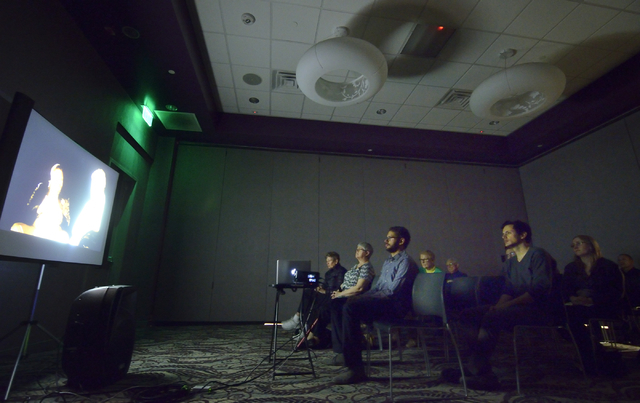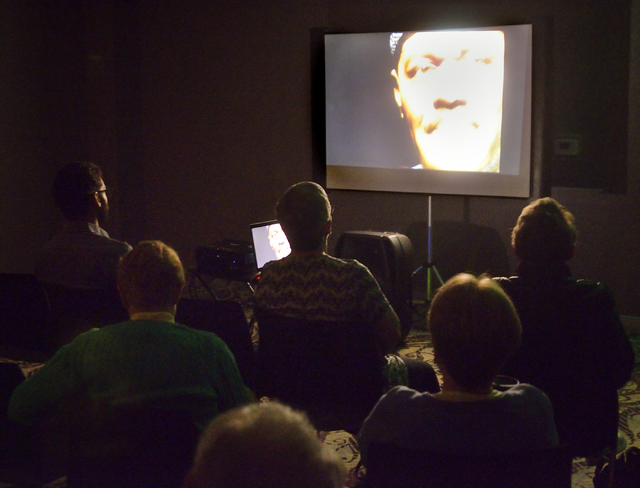Nevada group builds case against the death penalty
In a dark room at the Gay and Lesbian Community Center of Southern Nevada, people watched in silence as the film “The Exonerated” depicted stories of those sentenced to death while innocent.
Some stirred in their seats at uncomfortable moments. Some sniffled and wiped back tears during rough spots. But for the most part, the audience remained quiet as it took in the message of the movie.
This wasn’t a random film club convening over a movie.
Members of the Nevada Coalition Against the Death Penalty sponsored the movie night as one component of their efforts to educate the public about the flaws behind capital punishment.
“We are trying to have more events like this,” said Howard Watts III, a volunteer for the organization. “We want to take action and end (the death penalty) in this state.”
Nancy Hart, president of the Nevada Coalition Against the Death Penalty, noted the organization has been around since 2001 trying to educate the public about the subject.
The group is made up of volunteers, who work to make the best of limited resources. Part of that is putting on events to draw in more members.
“I think film screenings is a good way of doing that,” Hart said. “It’s an effective way to convey a message and it’s also more engaging than a straight presentation.”
Hart said the coalition has attracted a variety of people from activists to religious communities.
Watts, who has volunteered with the organization for almost a year, was one of those pulled into the cause.
He said there are many reasons why he began to work to abolish the death penalty.
“For me, it comes from learning how many errors there are in the criminal justice system,” Watts noted. “There is always the risk of executing someone who is innocent. It’s not worth that risk.”
“The Exonerated” talks about six cases of people wrongfully sentenced to death and later found to be innocent — some decades after being imprisoned. Though it was dramatized, the film used transcripts of actual court documents and interviews to tell the stories of the exonerated inmates.
According to the Death Penalty Information Center, 156 people have been exonerated since the death penalty was reinstated in the ’70s.
During the event, Watts went over the reasons the organization is fighting to abolish the death penalty, such as the cost factors.
In Clark County, it costs about $200,000 more to seek the death penalty than other cases, according to the organization.
Watts argued the organization is also against capital punishment because the process of executing someone — and the years of waiting on death row through the appeals process — goes against the Eighth Amendment, which prohibits cruel and unusual punishment.
Hart said it was the human rights aspect as well as the question of its constitutionality that made her passionate about advocating for its demise.
But she has seen various aspects draw people into the organization.
Many of the advocates also point out the racial disparities they see in the system.
According to the organization, Nevada has the highest number of death row inmates per capita in the country. Currently, 80 inmates are on death row.
“About 40 percent of inmates on death row are African-American despite Nevada being 9 percent African-American,” Watts said.
The organization is working on a two-pronged approach to ending the death penalty in Nevada.
The first starts with movie nights and panel discussions like the one they put on Monday.
“We have to educate the public,” Watts said.
Hart said with more and more news coverage of the death penalty — from states abolishing it to news reports on botched executions — the past decade has been a good time to discuss it.
“I think more people are becoming more receptive,” she said.
The second aspect is working with lawmakers from both parties to talk about the moral and financial costs of the death penalty, hoping to appeal to them in some way.
Hart said they haven’t introduced a bill to repeal the death penalty.
“I think we are still educating lawmakers on the subject,” she said. “But I think we have some lawmakers who are open to discussing it.”
Watts said during the past legislative session, lawmakers approved the construction of a new execution chamber since the current one isn’t compliant with the Americans with Disabilities Act.
“We would love to have the governor announce a moratorium,” Watts said — the governor of Pennsylvania announced a moratorium on the death penalty in 2015. “But since (Gov. Brian Sandoval) wants to build a new execution chamber, I don’t see that happening.”
Contact reporter Michael Lyle at mlyle@reviewjournal.com or 702-387-5201. Follow @mjlyle on Twitter.































